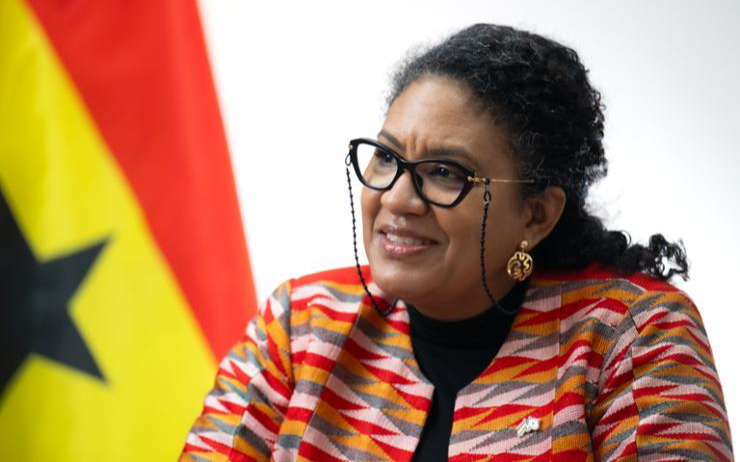Ghanaian Ambassador to Korea Charis Obetsebi-Lamptey Zwennes discusses the upcoming Korea-Africa Summit during an interview with The Korea Times at the Embassy of Ghana in Seoul, March 26. Korea Times photo by Choi Won-suk
Ghanaian ambassador wants more Korean investments in various sectors
Editor’s note
This article is the third in a series of interviews with African ambassadors to Korea ahead of the Korea-Africa Summit in June. ― ED.
By Kim Hyun-bin
Ghana anticipates using the upcoming Korea-Africa Summit as a means to engage meaningfully with Korea to establish processes for mutually beneficial collaboration, according to its envoy to Seoul.
The summit, the first of its kind, is scheduled to take place from June 4 to 5, offering African nations including Ghana a significant opportunity to strengthen ties with Korea. Anticipated discussions during the summit will span multiple sectors, emphasizing economic collaboration and cultural exchange.
“Korea will have a vision of its commitments to the African continent, and Ghana’s perspective on this will be articulated and discussed within the summit,” Ghanaian Ambassador to Korea Charis Obetsebi-Lamptey Zwennes said during an interview with The Korea Times at the Embassy of Ghana in Seoul, March 26.
“The summit will provide a platform for Ghana to pursue the enhancement of our relations with the Republic of Korea.”
Economic cooperation is set to be a focal point of discussions during the summit, with both countries eyeing deeper cross-sector collaboration such as infrastructure, manufacturing, oil and gas, mining, energy, innovation, ICT and technology.
The ambassador emphasized the potential for increased investments and partnerships between Korean and Ghanaian companies, especially in areas where Ghana offers strategic advantages, such as its “business-friendly climate” quality human resource, abundant natural resources, fertile lands and strategic location for trade and transportation.
The summit offers a chance for Ghana and Korea to delve into fresh avenues for collaboration and tackle common challenges for mutual benefit. With a population of 1.4 billion and a gross domestic product of $3.4 trillion, Africa is a huge market and despite its significant potential its economic ties with Korea are currently limited.
“We’re hoping that during the summit, there will be high-level talks between the Korean and Ghanaian officials and this will help leverage and discuss the promotion of economic opportunities between the two countries,” she said.
“And of course, then there’s the business forum to be held the next day that would be an opportunity for public and private sector to help facilitate the promotion of trade and investment between Ghana and Korea.”
Korea and Ghana established diplomatic relations in 1977 and have been fostering closer bilateral ties ever since.
“We’ve had several cooperation agreements in various sectors, which have been signed or are ongoing, including projects like the K-rice belt project, in which Ghana is one of the eight African countries involved,” the ambassador said.
Last July, Korea’s agriculture ministry launched the “K-Ricebelt” program, designed to provide superior rice varieties and share agricultural knowledge with partner countries, bolstering sustainable food security efforts.
Attracting Korean investments
Highlighting the economic potential of both nations, the ambassador pointed out the establishment of Kia’s assembly plant in Ghana as an example of a successful public-private sector partnership.
“Both countries possess a tremendous economic potential that could be harnessed for mutual benefits,” she said.
She further emphasized the importance of drawing increased Korean investments across various sectors, underscoring Ghana’s strategic location, business-friendly environment and membership in the Africa Continental Free Trade Area as favorable conditions for investment. The ambassador also expressed hope for increased engagements in the private sector following the summit.
“For now mainly it’s been at government-to-government level and private sector engagement has been lacking but that is the gap that we want to now fill,” she said.
“So now some private companies have started going to Ghana and hopefully after, the business summit, more Korean companies would see the opportunities and find it reasonable and economically beneficial to look at the opportunities that are available in Ghana.”
Noting the presence of Korean companies in Ghana, particularly in the fishing industry, she hoped for expanded Korean investments in various sectors.
“With Ghana’s abundant natural resources and young population, the country offers attractive opportunities for Korean investors. Sectors such as manufacturing, infrastructure, mining, energy, agriculture, technology and innovation were identified as areas ripe for collaboration,” she said.
The ambassador also lauded the educational exchange programs between Korea and Ghana, noting the opportunities provided to Ghanaian students to pursue advanced degrees in Korean universities through scholarships.
Tourism also presents an avenue for collaboration, with Ghana boasting a rich cultural heritage and diverse tourist attractions, including national parks, historical sites and vibrant festivals, which the ambassador expressed hope for increased Korean tourist traffic to Ghana, highlighting the unique experiences awaiting visitors.


